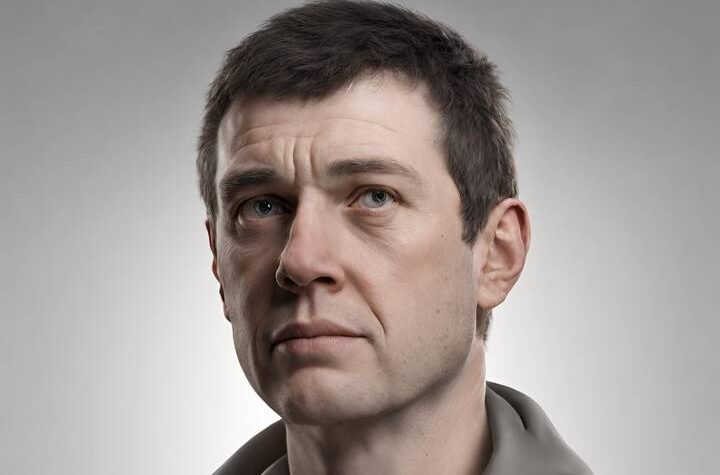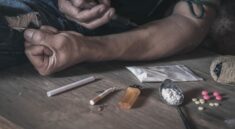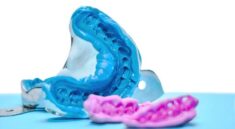Famous individuals with DiGeorge Syndrome show that success is possible even when facing a genetic disorder. They excel in their chosen areas and prove that determination can overcome challenges. These people serve as role models, inspiring others facing similar struggles.
Their stories are relevant because they showcase these individuals’ strength and determination. Their accomplishments prove that a genetic disorder does not limit greatness.
Explore the motivating tales of famous people living with DiGeorge Syndrome. Despite facing challenges, they left a lasting impact on the world.
Roger Evans
Roger Evans, a 47-year-old living in Aurora’s Friendly Village Mobile Home Park, has become well-known in medical circles, especially at the Children’s Hospital of Philadelphia and Columbia University Medical Center.
Four years ago, Roger was diagnosed with DiGeorge syndrome, a rare genetic disorder also called 22q11.2 Deletion syndrome. Despite the severe heart defects and parathyroid issues linked to the condition, these problems only appeared for Roger in adulthood.
Even with significant health problems like kidney failure and frequent pneumonia, Roger stays positive. He requires calcium infusions for his muscle function due to his parathyroid troubles; however, he continues to seek treatment options.
Roger hopes to get a transplant for his nonworking parathyroid glands, but insurance issues create a big challenge. His dedication to improving his health and friendly nature has made him a well-known figure among geneticists, endocrinologists and researchers familiar with his case.
Navigating unknown territory, Roger actively researches online, connecting with others with the same rare condition. He keeps a detailed folder outlining his medical history.
Living alone and working in a hotel reservations center, Roger’s life seems average. But he shows incredible determination and unwavering commitment to solving his medical issues.
Mya Powell
Devin Booker plays for the Phoenix Suns. His younger sister, Mya Powell, has DiGeorge syndrome. This has influenced his outlook on life. Booker is active in the Special Olympics because of Mya’s condition. He mentioned in a 2020 video that having a sister facing daily challenges gives him deep life lessons. Booker credits his success to Mya’s support and recognizes her impact on his life.
Mya Powell was born on March 21, 2002, and has the same mother as Booker—Veronica Gutierrez-but different fathers. Melvin Booker, a former NBA player, is Devin’s father, while Powell is Gutierrez’s daughter from another relationship. Living with DiGeorge syndrome, Powell experiences 22q11.2 deletion syndrome which can cause difficulties in social situations.
Devin always supports her and helps her feel at ease throughout her life. Despite the challenges, Mya brings happiness to Booker’s life. In 2016, he mentioned how she improved their lives and emphasized her strong influence on him and their family.
Joey Menzo
Joey Manzo, a 32-year-old with DiGeorge syndrome, has overcome many obstacles and followed his dreams. Born with this genetic issue that involves a missing part of chromosome 22, Joey faced several medical problems like heart defects, cleft palate, and a higher risk of infections. Yet, he has achieved many significant milestones, such as owning his house and holding a full-time job at Goodwill.
Joey’s love of adventure is evident as he fully experiences life. He has taken solo trips, tried parasailing, and even skydiving, showing he doesn’t let fear control his decisions. He has been treated at Boston Children’s Hospital, especially at the Heart Center.
Even though he’s undergone many heart surgeries and hospital stays due to his special medical needs, Joey focuses on moving ahead and living the life he wants. His solid support network of close family and dedicated healthcare professionals is vital to his overall health. It allows him to overcome challenges and chase his dreams.
Ella Gregorich
Ella Gregorich, a three-year-old girl from Great Gonerby with DiGeorge syndrome, may experience changes in her care that her mother worries could put her life at risk. DiGeorge syndrome, also called 22q deletion syndrome, shows various symptoms like heart issues and learning difficulties.
Currently, Ella gets overnight assistance from skilled nurses, but it could shift to care staff. Her mother, Andrea Gregorich, thinks this is a cost-saving decision. She’s worried the care staff won’t be able to manage Ella’s unique needs when she’s sick and plans to fight the change.
Ella had major heart surgery at 16 weeks old. Her mom highlights how critical it is for nurses to make medical choices based on her daughter’s health – something she doesn’t think carers can do. The suggested changes provoke concerns about Ella’s well-being, especially given the 45-minute trip to the closest hospital in Nottingham during an emergency.
Thalia Noble
Nine-year-old Thalia Noble is about to have her eighth brain surgery and decided to donate 14 inches of her hair to Wigs for Kids, helping children with medical issues that cause hair loss.
Thalia has DiGeorge syndrome, which has resulted in many health problems, such as three open heart surgeries, seven brain surgeries, stroke, coma, three brain bleeds, diabetes insipidus, colitis, enteritis, and other complications. It has been shared that Thalia’s skull isn’t growing while her brain is, so she needs cranial expansion surgery at Children’s Hospital Orange County (CHOC).
Seeing other families face challenging circumstances during their extended stays at CHOC inspired Thalia’s parents Jillian and Aaron Noble to give back. Thalia’s dad mentioned their wish to help others in difficult situations despite Thalia’s condition’s impact on their family. After her subsequent surgery, Thalia will need constant care for six months during her recovery.
Ava Davies
Nine-year-old Ava Davies, diagnosed with DiGeorge syndrome, a congenital condition causing heart defects, received a French bulldog named Poppy as a companion during the Covid-19 lockdown. The dog became an essential source of comfort for Ava, who suffers from anxiety, providing companionship and transforming her life.
However, Poppy developed a sudden mystery condition, leaving her back legs paralyzed. The family, unable to cover the costs of additional vet treatments, faces the heartbreaking possibility of putting down Poppy. To raise funds for Poppy’s MRI scan and necessary treatment, Ava’s aunt has initiated a GoFundMe campaign called ‘Save Poppy.’
Despite Ava and Poppy’s inseparable bond and the positive impact the dog has had on Ava’s mental well-being, the family’s insurance doesn’t cover the required scans and treatments. Without the necessary MRI scan, the vet has suggested the heartbreaking option of letting Poppy go. The family has expressed gratitude for the generosity of those who have donated.
Wendy Hamer
Wendy Hamer, 58, who lives at Nigel House in Saanich, has DiGeorge syndrome. This rare disorder causes heart issues and learning challenges. Wendy has called Nigel House her family for almost five years. Her DiGeorge syndrome got increasingly severe as she aged, leading to seizures and other problems.
Wendy and the other 25 residents enjoy watching the construction of the expanded Nigel House. She hopes to have private rooms, bathrooms, and improved daily living spaces. Wendy’s enthusiasm extends beyond the physical upgrades; she looks forward to the shared living room with a fireplace and fish tank. It will offer her a cozy space to unwind and enjoy her knitting.




